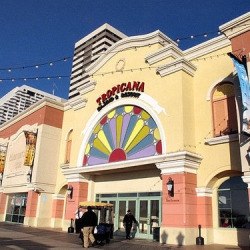In 2007, the Tropicana Casino in Atlantic City was on the verge of closing. When the global recession began the next year, no one could imagine the Tropicana surviving. Yet here in 2015, the Boardwalk casino is a thriving business, even as gaming venues enter bankruptcy and close. One-third of the casinos in Atlantic City closed in 2014, yet the Tropicana thrives.
The road to prosperity was complicated. In fact, the previous owner of the casino, Columbia Sussex Corp., cut back to a skeleton crew and seemed to stop taking care of the property. At one point, the New Jersey Division of Gaming Enforcement stripped the casino of its license. Columbia Sussex had to leave the Atlantic City gaming business, because New Jersey regulators decided the company was not capable of providing a first-rate casino experience.
Diamond in the Rough
Tropicana President Tony Rodio, who managed another AC casino at the time, said that the place had potential, but it needed direction to match its potential. Carl Icahn provided that directed. Rodio said, “When you think back to that period of time, this place was a diamond in the rough. It had all the things that everybody says you need to have to succeed in the new Atlantic City, including plenty of non-gaming amenities. It was just a matter of polishing the diamond up.”
Enter: Carl Icahn
Everything began to change in 2010. That was the year Carl Icahn bought the casino. Icahn, who has owned the Trump Taj Mahal since February 2015, pumped $130 million into the property. Those investments came over a 5-year period, including a $50 million renovation which still hasn’t been completed. The latest renovations are set to be ended by Memorial Day this year.
The beginning of the turnaround happened on a more basic level, says Rodio. The casino’s current president says that staff had to be re-energized and retrained. He told News OK, “The first thing we needed to do was turn around the morale and the attitude of the employee base. We told them things were going to get better, and then we delivered on that.”
High-Stakes Gaming
When Carl Icahn took over, the biggest single change in marketing was to focus on high-roller gaming. That meant increasing the limits at which gamblers could bet, from the premium player range to the “whales”. In gambling parlance, a whale is a mega-high roller. Their wins and losses can affect the bottom line enough they are reported as a line-item on monthly and quarterly reports.
Catering to mega-high rollers opens the casino to big losses from time to time. The trade-off is the ability to make much larger profits. A handful of dedicated whales increase the gaming profits for a casino significantly, though the casino sometimes registers losses. That requires an ownership group with deep pockets and patience, which is what Carl Icahn brought to the table.
In the second quarter after Icahn took over the Tropicana, the gross operating profits were $9.8 million. In the last quarter, the gross operating profits had ballooned to $59.8 million. Tropicana in now the third-leading casino in Atlantic City, generating big revenues in an era when many of its competitors are failing. But the operation wants to continue to generate new sources of revenues, which is why Carl Icahn is pouring profits into investments in the casino.
Non-Gaming Improvements
The latest renovations are more attuned to the mass market and non-gaming crowd, which is another current trend in destination tourism. The Las Vegas Strip’s generates 60% of its revenues from non-gaming sources these days. That number includes shows like Cirque du Soleil and David Copperfield, nightclubs, restaurants, hotel stays, and shopping. Atlantic City’s business leaders are trying to learn a lesson from Vegas, which is why Carl Icahn has invested in Tropicana’s non-gaming attractions.
The new Tropicana includes an outdoor light show, a feature which can be seen for miles. The north tower of the Tropicana has been renovated, and now has 434 hotel rooms. The casino has a fitness center which is open to the public.
What Icahn Means for Trump Taj Mahal
Those who want to see the Trump Taj Mahal survive and thrive should take heart from the Tropicana example. Many of the complaints that were made about the Tropicana in 2008 are now being made about Trump Taj Mahal in 2015: ownership doesn’t renovate or even maintain the place, while the ownership does not cater to high-end customers. When Carl Icahn transfers the one business model to the other, Trump Taj Mahal should be a big success.
Donald Trump and his daughter, Ivanka, released a statement after Icahn finalized his purchase of the Tropicana making that point. Both said they knew the casino which bears their family name was in good hands, because he would take the steps needed to transform the business. Tropicana’s bottom line is the best evidence that the Trumps were correct in that assessment.

